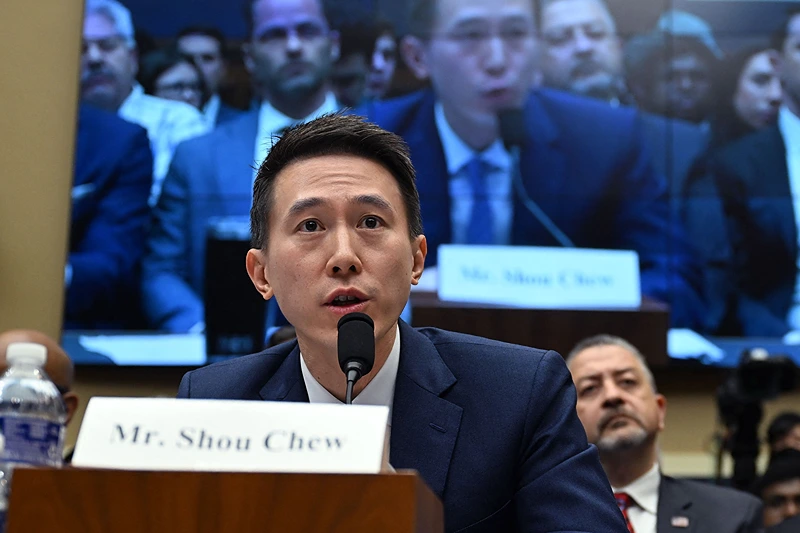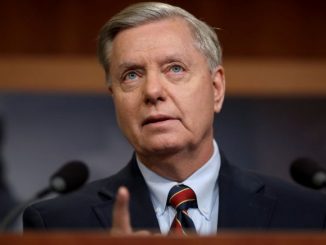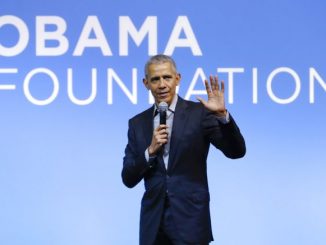

OAN Brooke Mallory
UPDATED 12:59 PM – Thursday, March 23, 2023
Shou Zi Chew, the CEO of the popular app TikTok, has testified before the House Energy and Commerce Committee on Thursday in front of a resistant audience. This comes as his company faces a potential ban in the United States.
The session will pose empirical issues for the U.S. government over how it modulates technology, even though only TikTok is in the spotlight. Legislators are aware that issues with extensive data collecting and the power to control what information people see go far beyond the app. Legislators and users share similar concerns about U.S. tech platforms like Meta’s Facebook and Instagram, Google’s YouTube, Twitter, and Snap’s Snapchat.
This entails that lawmakers will have to consider how to best handle consumer harms across the business, in addition to trying to ascertain whether TikTok can successfully protect American users under an owner who lives in a communist regime.
Speaking with lawmakers, congressional staffers, and outside experts ahead of the hearing has highlighted the delicate line that must be crossed by the government, in order to protect American national security without taking unwarranted action against a single app and infringing on First Amendment rights.
The possible hazards that TikTok’s ownership by the Chinese corporation ByteDance poses to American national security is not widely accepted in Washington. On government-owned devices, the software has already been outlawed by Congress, and other states have followed suit.
The interagency council entrusted with examining national security issues emanating from ByteDance’s ownership has threatened a ban, if the company won’t sell its part in the app.
However, an outright prohibition presents its own set of legal difficulties.
“If members focus solely on the prospect of a ban or a forced sale without addressing some of the more pervasive issues, particularly those facing children and younger users, shared by TikTok and U.S.-based social media companies, I think that would be a mistake,” said Representative Lori Trahan (D-Mass.) who is a committee member.
The chairman of the Energy and Commerce subcommittee on innovation, data, and commerce, Representative Gus Bilirakis (R-Fla.), said he and many of his colleagues are entering the meeting with an open mind to solutions.
“We have to be open-minded and deliberate… But at the same time, time is of the essence,” Bilirakis said in an interview on Wednesday.
If the government presses for a ban when the concerns may reasonably be alleviated with a less restrictive policy, it could pose First Amendment challenges, voiced Jameel Jaffer.
Jaffer is the executive director of the Knight First Amendment Center at Columbia University.
“A ban here is in some ways under-inclusive because it would be focused just on TikTok or a small number of platforms, when in fact many other platforms are collecting this kind of information as well… And in other ways, it would be over-broad because there are less restrictive ways that the government could achieve its ends,” Jaffer said.
Some people may question if denying Americans access to TikTok is really a violation of their rights, but Jaffer argued that the public should see it in the context of the U.S. government’s power to regulate which media sources Americans can access.
“It’s a good thing that if the government wants to ban Americans from accessing foreign media, including foreign social media … It has to carry a heavy burden in court,” Jaffer continued.
Many legislators concur that, should it choose that course, the government should make a stronger case to the American people for why a ban is required. For example, the bipartisan RESTRICT Act recently presented in the Senate would demand such an explanation when the government wishes to ban foreign-owned technology for national security reasons.
“The message that I want folks to hear is that we cannot afford to pass this legislation or something like it, watch the administration ban or force the sale of TikTok and declare victory in the fight to rein in the abuses of dominant Big Tech companies… I think the conversation right now about a ban certainly threatens to let Big Tech companies off the hook, and it’s on Congress not to fall into that trap,” Trahan proclaimed.
There is no way to be certain that any data gathered previously is beyond the grasp of the Chinese government, even if the U.S. is successful in banning TikTok or compelling it to separate from ByteDance.
John Lash, who consults clients on risk mitigation agreements involving the Committee of Foreign Investment in the U.S., posed a question.
“If that divestment would occur, how do you segregate the code bases between ByteDance and TikTok? And how is the U.S. government going to get comfortable that the asset, TikTok, which is hypothetically sold, is free of any type of backdoor that was either maliciously inserted or just weaknesses in code, errors that occur regularly in how code is structured?”
Eric Cole, a cybersecurity expert who started his career as a hacker for the Central Intelligence Agency (CIA), said he believes the concern regarding TikTok is valid, but that his biggest issue is that it’s seemingly too late to fix what has already been going on.
“At this point, it’s so embedded that even if they were successful in banning Tiktok altogether, the damage is done,” Cole said. Thursday’s hearing will focus on numerous senators on both sides asking for comprehensive privacy legislation, like the kind the panel passed last year but which never made it to the floor for a vote.
The calls serve as acknowledgement that many of the worries about TikTok, apart from its ownership by a Chinese business, are shared by other big tech companies located in the U.S.
Both Trahan and Bilirakis underlined the need for privacy reform as a more methodical response to the challenges raised by TikTok. Both stated they would focus on TikTok’s protections in the hearing because they are especially concerned about the company’s potentially detrimental effects on younger generations.
TikTok has pushed a sophisticated scheme known as “Project Texas” to help appease U.S. worries over its ownership. According to the idea, it will base its domestic U.S. data operations there and permit other parties to review and submit its code to the app stores.
Analysts and even some legislators admit that Project Texas at least offers a step forward on key aspects of consumer protection they’ve campaigned for in the tech industry more widely.
“TikTok is in a really unique position right now to take some positive steps on issues that a lot of top American companies have fallen behind and frankly even regressed on, whether it’s protecting kids or embracing transparency,” said Trahan.
While she believes there are still many questions TikTok needs to answer about the adequacy of Project Texas, Trahan voiced that she is still optimistic about the company’s proclaimed “openness to stronger transparency mechanisms.”
In their pre-hearing interviews, lawmakers and aides made it clear that no matter how TikTok is addressed in particular, comprehensive privacy legislation will still be required. That way, a situation like this could be avoided in the future, and it also holds American businesses to higher standards.
Yet, given that federal digital privacy laws don’t exist yet, Lash mentioned that the U.S. should evaluate what it would mean, on a grander scale, if Project Texas were to go away.
“In lieu of comprehensive federal data privacy regulation in the United States, which is needed, does Project Texas give the best available option right now to protect national security? And does it continue if ByteDance is forced to divest their interests?” questioned Lash, whose advice is one of a select few companies with the knowledge to help the business with a contract, should a deal go through.
According to Lash, the plan appears to address the concerns of lawmakers, but what it can’t convey are “the theoretical risks around may happen, could happen as it relates to the application.”
Earlier this week, a House Energy and Commerce Committee official who was only permitted to talk on the record, told reporters that TikTok’s risk reduction strategies were “purely marketing.” Even if the United States can be certain that the information is secure, another committee aide claimed that it would be extremely difficult to examine all of the current code for flaws.
According to committee aides, Energy and Commerce Chair Cathy McMorris Rodgers (R-Wash.), favors both a ban to address the immediate concerns TikTok poses and comprehensive privacy legislation that was approved by the committee to stop reoccurring issues.
On Tuesday, Chew posted a personal TikTok video from his account praising the platform’s 150 million monthly active users in the U.S., and urged others to add their own comments to the video explaining why TikTok is so special to them and why legislators should stop trying to ban the social media app.

Stay informed! Receive breaking news blasts directly to your inbox for free. Subscribe here. https://www.oann.com/alerts





Be the first to comment